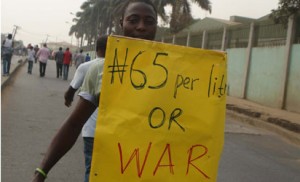Fuel Subsidies – Who is Being Subsized? – By Dr. Philip A. Ikomi
Posted by admin
Articles, Columnists, NNP Columnists, Philip Ikomi
Monday, June 9th, 2014

By Dr. Philip A. Ikomi | NNP | June 9, 2014 – The current National Conference has taken on the task of debating the question of fuel subsidy. Yet it is not clear who is really being subsidized. Some delegates who are really interested in making a case for continued subsidy find themselves arguing for the removal. King Diete Spiff, for example was reported as saying that the poor are subsidizing the rich and as such subsidy should be removed. If Diete Spiff is actually asking for the removal of subsidy to support the poor, then he does not know who is being subsidized. I would like to make some claims to show that the subsidy is actually being made to the generality of Nigerians, and the poor in particular and as such should be continued.
It is generally known that the governments of the country– federal, state, and local– are the largest employers of labor in a country like Nigeria that does not have an industrialized economy. If that is the case in Nigeria, then these governments have the largest fleets of vehicles in the country when compared with private ownership of vehicles. This means that government vehicles are the largest beneficiaries of the fuel subsidy in the country. Thus removal of subsidy can only harm the government which in turn will harm the generality of Nigerians for whom the governments provide services. These government services include postal services, trains, errand vehicles, police and military vehicles, ambulances owned by government hospitals, official vehicles for transportation of government officials, maintenance vehicles for roads directly constructed by government direct labor, government universities, colleges of technology, secondary schools, trade schools, and other government institutions’ vehicles, vehicles belonging to all ministries used for their services to the people, and vehicles used for the presidency. Right here we see a tall order already!
Now let us take a look at the rest of the consumers of fuel in the country besides the government, we can divide this group into three, namely, commercial transport of passengers, private transport of passengers, commercial transport of goods and services. In the case of commercial transport of passengers, we can say that the direct beneficiaries are the passengers, and these are in the millions who traverse our country daily in buses from north to south and east to west in poorly maintained vehicles that consume lots of fuel. They are charged a lot of money for the service and if the fuel subsidy is removed, prices will skyrocket and the poor will pay a heavy price.
The commercial transport of goods and services also is a very important and large area because here you would include transportation of all agricultural produce from the farms to the villages and cities where they are marketed. You also have farm equipment that have to be run with fuel to plant or to harvest. These are also benefiting from the present fuel subsidy whose removal is being debated. Do not forget that in the rivers our people use powered boats as a means of transportation and for fishing and evacuating their catch to ports. In addition you have the ferries that are needed in places that are still not connected with bridges. All these need fuel and they are mainly for the masses of this country. Finally, here is the consumer of fuel that is always on the minds of most people when the fuel subsidy talk or debate is initiated: The private car driver. From the foregone presentation it is obvious that the private car is in the minority. Only a significant number of people in Nigeria have privately run and owned vehicles. These are certainly not the wealthiest although the wealthy do have a few cars per capita, but they are an insignificant minority and their consumption of fuel cannot be a reason to raise fuel costs on all purchases.
The argument by government spokespersons that it will be good for Nigeria is a bogus one and has no merit. The loaner countries, the International Monetary Fund (IMF) and the World Bank (WB) the European Union (EU) and others that are pushing Nigeria to remove subsidy want that done for their own self interest. They want the Nigerian government to spend more money paying back the debt owed them so that Nigeria does not have enough to build infrastructure to eventually compete with the EU. In addition, they want to make Nigeria ungovernable by asking the government to remove subsidy. When there is chaos in Nigeria then Nigeria will not be able to develop and Nigerians can continue to relocate to Europe to replace the people they have lost and are losing due to low birth rates. With such plans, they can continue to dominate Nigeria. The fuel subsidy should be left intact for as long as Nigeria is an underdeveloped country that is not industrialized. When Nigeria becomes an industrialized country, there will be no more reason to subsidize the fuel. EU and the US subsidize their agriculture, milk, sugar, and others. Nigeria subsidizes fuel and she is told not to do so! Yet Nigeria is not industrialized!
Capt. Philip A. Ikomi, Ph.D.
Retired Airline Captain and I/O Psychologist
wp_posts
Related Posts
Short URL: https://newnigerianpolitics.com/?p=37338

































